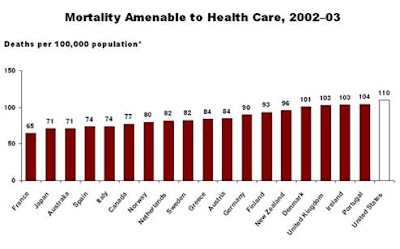If you've heard John McCain talk about health care lately, then you've heard him suggest that Democratic plans for universal health insurance would lead to long waits, higher costs, inferior care, etc.--since that's what they get in Europe.
As I've mentioned before, one of the many, many flaws with this argument is that the people in those countries don't seem to agree. Their systems have problems--some more than others--but overall people in the larger, more advanced European countries seem more content with their health insurance arrangements than most Americans are with theirs.
Today's news brings yet more evidence of this. On behalf of the International Herald Tribune and France 24 television, Harris Interactive surveyed people in the U.S., Britain, France, Germany, Italy, and Spain. The findings? Four out of five Americans say the system needs fundamental changes or a complete overhaul--the highest of all the countries surveyed.
As I said earlier, I plan to blog about health care from time to time. It really is amazing how much of a disgrace the US health care system is, and how little is being done about it.
All of the arguments being attributed to John McCain above are resoundingly false. Most European health care systems have lesser wait times, much lower costs, and lead to equal or superior health outcomes for their citizens. This applies to Canada as well, although I take issue with a few things that we do here as well (I'll take a whack at that in the future).
The US is the only First World country to lack universal health care. It is the only First World country to leave a large percentage of its population without health insurance. Yet, amazingly, it spends more than any other country on health care as a percentage of GDP (graph from the Commonwealth Fund):

What is wrong with this picture? As counter-intuitive as it is to many libertarian minded folk, a government administered health insurance scheme leads to a more efficient economic outcome than dozens of competing HMOs. It's that simple. A mountain of administrative costs plus inherent difficulties with assymetrical information between patient and provider make it difficult to reach a cost-effective arrangement within the private sector.
There has been much whining about the soaring costs of Medicare south of the border, and how it will eventually become insolvent. But look at this CBO graph:

The major increases in health care costs are projected to fall outside of the government system. This is also a moral issue:
So why has this situation been allowed to persist? The reason is that there has been an ongoing campaign of disinformation in US politics that uses key words like "socialized medicine" to scare a populace that instinctively distrusts government involvement in the economy. This campaign has been promoted by those who have a financial stake in the existing system, such as the HMO and drug companies. The Democratic candidates this time around are promising "universal healthcare", but in truth, neither Obama's or Clinton's plans go far enough. The disinformation campaign has been so effective that true reform may take a backseat for years to come. And it's a travesty.




No comments:
Post a Comment